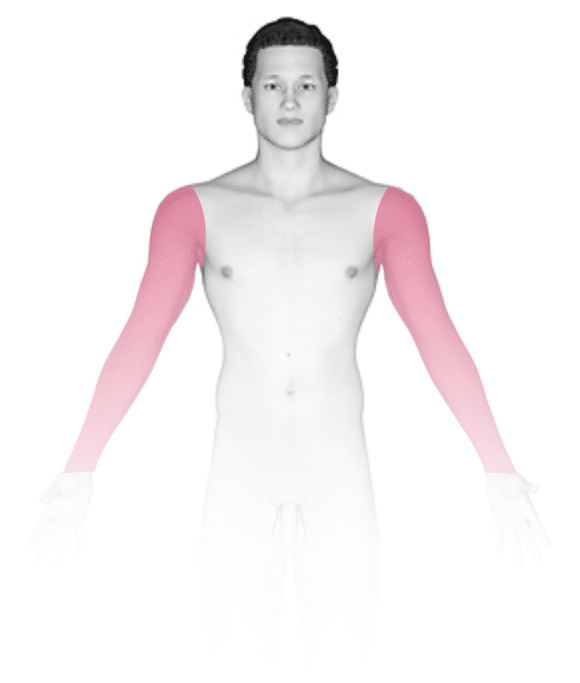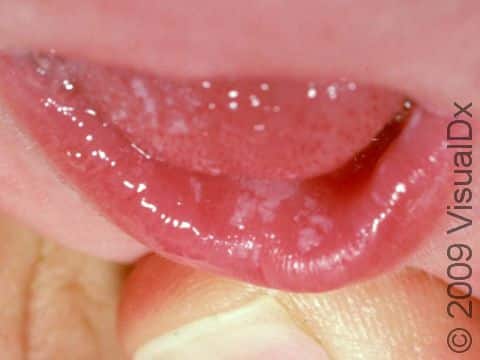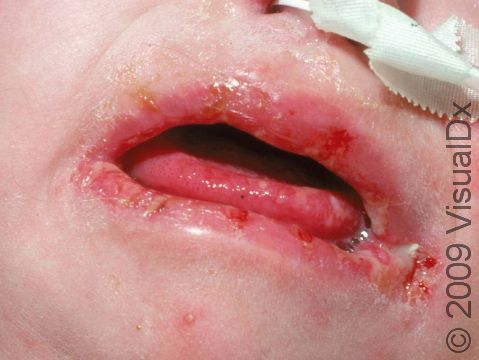Thrush (Oral Candidiasis)
Oral candidiasis, more popularly referred to as thrush, is a very common disease caused by an overgrowth of yeast in the mouth and/or throat. The most common yeast causing thrush is called Candida albicans.
Who's At Risk?
Thrush is very common in newborns and infants. It is important to note that thrush is not passed from infant to infant.
Infants more likely to develop thrush are those:
- On a course of oral antibiotics.
- Undergoing chemotherapy.
- With an immune disorder.
Other factors that can lead to infants being more predisposed thrush include leaving a bottle propped in the infant’s mouth and improper wiping after feedings.
Signs & Symptoms
Thrush may appear as white or pale yellow spots on the inner surfaces of the mouth and throat, the tongue, and the lips. It may resemble cottage cheese or milk curds. However, scraping off these membranes may be difficult and may leave slightly bleeding sores.
Thrush may be accompanied by a burning sensation in the mouth or throat (oral cavity).
Self-Care Guidelines
Thrush may make eating and drinking uncomfortable, and children with thrush may lose water in their body tissues, becoming dehydrated. It is important to make sure your child maintains good nutrition and fluid intake (hydration) while infected with thrush.
See your child’s doctor for treatment of thrush with prescription medications.
Treatments
Your doctor will instruct you on how to keep your child’s oral cavity very clean, and treatments will center on killing the overgrown yeast with anti-fungal medications:
- Nystatin – This medicine must touch the yeast in order to kill it. Nystatin comes in a suspension or liquid, and also in a lozenge, called a troche. Have your child swish the suspension around the mouth and then swallow it. The lozenge dissolves in the mouth. Use the suspension and/or lozenges several times a day until the lesions are completely gone.
- Amphotericin B suspension – Swish the suspension around in the mouth and swallow it several times a day until the lesions heal completely.
- Clotrimazole lozenge – Let the lozenge dissolved in the mouth several times a day until the lesions have healed completely.
- Fluconazole pill or suspension – Swallow this medication once daily for 5–10 days.
Visit Urgency
Thrush requires medication, which your child’s doctor will prescribe after a visit for evaluation. If your child has an immune system deficiency, you will need even quicker and more aggressive treatment to keep the yeast out of the bloodstream and prevent it from infecting other parts of the body. Seek immediate medical attention if the white or yellow membranes of thrush are accompanied by fever, chills, vomiting, or overall illness.
References
Bolognia, Jean L., ed. Dermatology, pp.837, 1095, 1096, 1185. New York: Mosby, 2003.
Freedberg, Irwin M., ed. Fitzpatrick’s Dermatology in General Medicine. 6th ed, pp. 2013. New York: McGraw-Hill, 2003.
Last modified on August 16th, 2022 at 2:44 pm

Not sure what to look for?
Try our new Rash and Skin Condition Finder

